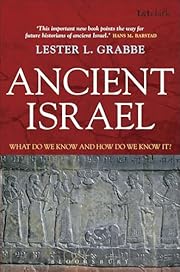

Click on a thumbnail to go to Google Books.
|
Loading... Ancient Israel: What Do We Know and How Do We Know It? (2007)by Lester L. Grabbe
 No current Talk conversations about this book.
"In this updated edition of his much praised volume Lester L. Grabbe takes readers through the earliest history of Israel paying close attention to the most recent sources and data."--
In Ancient Israel Lester L. Grabbe sets out to summarize what we know through a survey of sources and how we know it by a discussion of methodology and by evaluating the evidence. The most basic question about the history of ancient Israel, how do we know what we know, leads to the fundamental questions of Grabbe's work: what are the sources for the history of Israel and how do we evaluate them? How do we make them 'speak' to us through the fog of centuries? Grabbe focuses on original sources, including inscriptions, papyri, and archaeology. He examines the problems involved in historical methodology and deals with the major issues surrounding the use of the biblical text when writing a history of this period. Ancient Israel provides an enlightening overview and critique of current scholarly debate. It can therefore serve as a 'handbook' or reference-point for those wanting a catalogue of original sources, scholarship, and secondary studies. Grabbe's clarity of style makes this book eminently accessible not only to students of biblical studies and ancient history but also to the interested lay reader. For this new edition the entire text has been reworked to take account of new archaeological discoveries and theories. There is a major expansion to include a comprehensive coverage of David and Solomon and more detailed information on specific kings of Israel throughout. Grabbe has also added material on the historicity of the Exodus, and provided a thorough update of the material on the later bronze age No library descriptions found. |
Current DiscussionsNonePopular covers
 Google Books — Loading... Google Books — Loading...GenresMelvil Decimal System (DDC)933History & geography History of ancient world (to ca. 499) Palestine to 70LC ClassificationRatingAverage: (3.9) (3.9)
Is this you?Become a LibraryThing Author. |
|||||||||||||||||||||||||||||||||||||||||||||||||||||||||||||||||||||||||||||||||||||||||||||||||||||||||||||||||||||||||||
"This book is ... not a history of Israel but the preparation--the prolegomena--for such a history. It is aimed initially at scholars, with the intent of contributing to the current debate. By laying out as clearly as possible the main primary sources and drawing attention to the areas of debate and the arguments being advanced, I hope to give a snapshot of the field at the present time."
Be aware of that going in. If you're not already very familiar with the narrative of Israel given in the Hebrew Bible you'll get very little out of this book; if you're not already somewhat familiar with modern historical and archaeological findings and conclusions about ancient Israel you'll be lost quickly here.
Though conversant with this type of material, I often found myself struggling over mentions of "lower chronology", the "Iron Age IIC" period, the names of various scholars whose theories are frequently referenced, and various other technical terms left unexplained. Adding some brief introductory and explanatory comments would have gone a long way to making this book much more accessible to a lay audience. It comes across throughout as a book intended for graduate students wanting an overview of the subject.
There are no maps and only one chart that is not particularly helpful. More of both would have been extremely helpful.
This book is, however, very interesting. It discusses problems with the Biblical narrative, such as the lack of evidence for an actual state of the sort David was said to have ruled during the time he would have lived and the anachronistic insertion of the Philistines into Israel's history before they were actually settled in coastal Palestine. Evidence from artifacts, writings, inscriptions, and monuments are discussed along with various interpretations of the data. One gets a much better understanding of Israel's position vis-a-vis the great empires of its time (Egypt, Assyria, and Babylon) from this book, which covers up to the period of the Babylonian exile.
Not recommended for anyone who hasn't already been introduced to critical scholarship regarding ancient Israel as it is a bit more opaque to the nonspecialist than it needs to be. Would have benefited from a longer introduction and conclusion. (